This article on identifying and using chickweed is the first in a series on growing a weed garden, and how to identify and use the plants commonly found there. Check out the rest of the series here.
“Why in the world would I WANT to grow weeds?” That’s what you were just thinking, right? Either that or, “Is this about marijuana?”
As it turns out, I’m writing on the former. And if you’re still with me after learning that this article isn’t about cannabis, let me answer your question with some questions of my own.
Are you interested in growing your own herbal medicines? Grow a weed garden! Many common weeds are also powerful medicines.
Do you want to grow your own highly nutritious, homegrown food? Grow a weed garden! Most wild edibles are ridiculously nutritious; often much more so than the foods you’re already growing in your garden. (I will admit, however, that a potato is much more user-friendly than stinging nettles.) Plus, you’ll know for sure that these weeds haven’t been sprayed with any (gasp!) weed killer.
Are you cursed with gardening failures? Grow a weed garden! Unless you’re growing it inside a chicken coop or downstream from a glyphosate factory, you literally cannot mess this up. Those weedy little boogers are a hale-and-hearty crew, just chomping at the bit to take over any scrap of substandard, underwatered, compacted, nutrient-poor soil.
Are you preparing for the electromagnetic-zombie-pandemic-peak-water-financial-collapse apocalypse? Grow a weed garden! Looters might make off with your tomatoes, but they’ll never think to steal your thistles. Actually, I think I’d like to see them try that. But my point is that these are food and medicine resources unknown to the majority of the population. You can think of them as your backup-backup food supply.
Getting Started With Your Weed Garden
So I’m going to assume that you’re all fired up and ready for a weed garden, or at least not starkly opposed to the idea, and I’ll move on to the “how to” section. Making a weed garden is stunningly easy. At bare minimum, all you have to do is point to a part of your yard and say, “This is my weed garden.” Done! I’ve got a whole bunch of them out back. I’ll leave it up to you to convince your significant other that it’s time to sell your lawn mower. I mean, who mows their garden, right?
But let’s say you want to be a bit more official.
Sure. I knew I liked you. You want to grow weeds the right and proper way. Good for you.
For a “real” weed garden, do the following:
- Prepare a garden bed as you would for any other plant.
- Stop.
That’s it. Just loosen the soil, because even weeds like fluffy soil, and remove any pre-existing weeds to give everybody a fair chance to compete.
This is especially true of grasses. If you want a really good weed garden, get rid of the grass. No-good, dirty, rotten, grass (grumble, grumble). I’m slightly prejudiced, in case you couldn’t tell.
This is zero maintenance. No need to fertilize, water, weed (apart from the initial weeding), or sow seeds. Trust me. The seeds are already there, just waiting for their chance to shine.
Here’s a before-and-after picture of a weed garden I just set up:
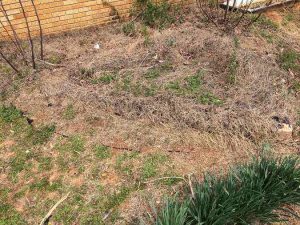
My Weed Garden, Before
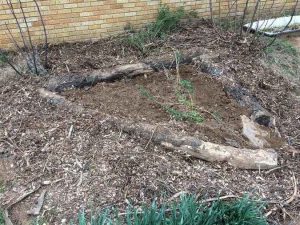
My Weed Garden, After
This was formerly an experimental garden, set up a few years back and eventually surrendered to the grasses. A morning of TLC with a digging fork and an audiobook brought it back into fighting condition. During the clean out, I discovered a goji berry stem that had snaked its way through the sea of grass and was setting out roots where it contacted the soil.
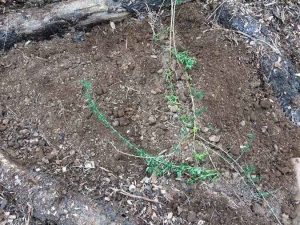
Goji
I couldn’t bring myself to uproot such a tenacious survivor, so it got to keep its place. Also, I added a wood chip border, because, “by golly I’ve got a big pile of wood chips, and I’m gonna use it!”
Now let’s take a look at the weeds in the… Oh, right. This is day one. Even weeds don’t pop up that fast.
Okay. We’ll come back to this later on. For now, let’s take a look at one of the weeds that was growing in that maelstrom of grass before I cleared it out.
I give you … chickweed!
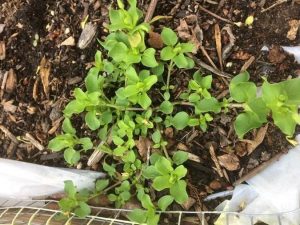
Chickweed
Chickweed is a sweet little plant with a love for cool, wet weather. It can be found in every state in the U.S. and throughout much of the world, even growing as far north as the arctic circle.
Where I live, in the Ozark Mountain region of Arkansas, you can find chickweed in the early spring and often again in the fall. The further north you go, the more it can stretch toward summer. Further south it leans more toward winter. If you have just the right climate (or microclimate), it can grow year-round. If you’ve got cool, pleasant weather, you’ve almost certainly got chickweed.
Chickweed tends to pop up in yards, gardens, pastures, and along the edges of paths. It likes rich, moist soil, and doesn’t seem too particular about sunlight. It must really like people, too, because it grows around us a lot. You’ll also occasionally find large patches growing in entirely the “wrong” place, because plants never read a plant book.
This is a great early plant to identify in your weed garden. First, it’s delicious. Some compare the taste to lettuce or corn silk, though I would describe it more like a snap pea. It’s also highly nutritious. Chickweed is a good source of beta-carotene, ascorbic-acid, magnesium, niacin, calcium, riboflavin, selenium, thiamin, copper, and Gamma-linolenic-acid.[1]http://www.eattheweeds.com/chickweed-connoisseurs-2/ It also has more iron, zinc, and potassium than any of your garden greens.[2]Edible Wild Plants: Wild Foods from Dirt to Plate. John Kallas, PhD. Gibbs Smith. 2010 It can be used in salads, soups, fritters, and almost anywhere else you want something green. I’m partial to homemade weed pizzas, myself.
Do yourself a favor. Mix up some freshly rinsed chickweed with flour, salt, and pepper. Form it up into patties and fry it in coconut oil. Then dip the resulting crunchy goodness in honey mustard or barbecue sauce. Delicious!
Identifying Chickweed
By this time, I’m sure you’re practically salivating for some chickweed. And who could blame you? So let’s move on to identification.
Note that I’m focusing on common chickweed (Stellaria media). There are other varieties of chickweed, such as mouse-ear chickweed, that will match some, but not all, of these criteria. For more information on other types of chickweed, you really should look at a more exhaustive guide or talk to a local plant expert.
Common chickweed is a thin-stemmed plant with small (¼” to ½”), opposite leaves. The leaves vary a bit in shape, but are usually oval, and always have a tiny point at the tips. She’s usually a small plant, but can grow stems more than a foot long when conditions are right. The sap is NOT milky. If you pluck a stem and discover white sap, you’ve got the wrong weed. The bloom is white with 5 deeply notched petals, which will look like 10.
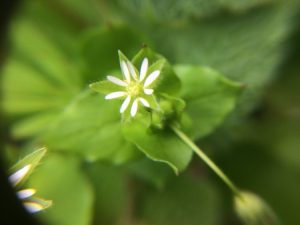
It has two more dead giveaways. One is a single line of hairs growing down the stem. This line will switch sides after every pair of leaves.
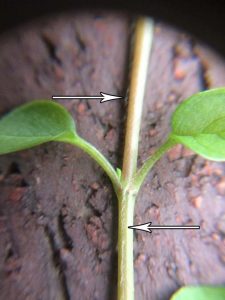
The hairs are tiny, and you may need to either hold it up to the light or use a magnifying lens to see them. The other telltale sign is an inner core. It takes a little practice, but you can bend the stem back and forth, and twist slightly, to break apart the outer stem, revealing a slightly elastic inner stem.
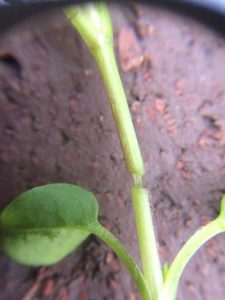
All of the aboveground parts are edible. On younger plants, the entire stem is tender. As they age, the lower stems become tough and stringy. You can chop them up, if you’re desperate. But I prefer just cutting off the last 2 or 3 inches at the growing tips.
Medicinally, chickweed is no slouch, either. Its primary claim to fame is in skin care. Owing to its wound-healing, soothing, and cooling properties, chickweed is an obvious choice for various skin irritations. It can be used in poultices, sprays, and creams—both as a beauty aid and for the treatment of rashes, bites, burns, and blemishes. It is also a digestive aid, helping to relieve excess gas in the intestinal tract.[3]Reference: The Wild Wisdom of Weeds: 13 Essential Plants for Human Survival. Katrina Blair. Chelsea Green Publishing. 2014
I hope I’ve gotten you interested in the idea of a weed garden, or at least in trying out some chickweed. Next time, we’ll check back in with my weed garden to see how it’s coming along and choose a new weed to feature.
Meanwhile, let me know in the comments section: What’s your favorite way to use chickweed?
_______________________________________________________
Psst! Our Lawyer Wants You to Read This Big, Bad Medical Disclaimer –> The contents of this article, made available via The Grow Network (TGN), are for informational purposes only and do not constitute medical advice; the Content is not intended to be a substitute for professional medical advice, diagnosis, or treatment. Always seek the advice of a qualified health care provider with any questions you may have regarding a medical condition. If you think you may be suffering from any medical condition, you should seek immediate medical attention. You should never delay seeking medical advice, disregard medical advice, or discontinue medical treatment because of information provided by TGN. Reliance on any information provided by this article is solely at your own risk. And, of course, never eat a wild plant without first checking with a local expert.
_______________________________________________________
(This article was originally published on April 2, 2018.)

Scott Sexton is a TGN Trailblazer, a highly experimental gardener, an unrelenting weed-eater, and a largely non-profit herbalist (much to his wife’s chagrin). When Scott is not teaching foraging classes, testing out theories in the garden, or grazing in the forest, he can be found at his Facebook page, “A Forager’s Guide to the Zombie Apocalypse.â€


I love my weeds! But I don’t think my neighbors appreciate them as much as I do. : )
Just tell them it’s for the honeybees. 😉
I love my weeds! But I don’t think my neighbors appreciate them as much as I do. : )
Just tell them it’s for the honeybees. 😉
I also love my weeds and like you do not like GRASS! I’ve even brought in weeds I can’t find easily around here like dandelions and plantain from further up north. I’m on the Georgia Florida border.
That’s great to hear! I’ve imported a few myself. It makes me wonder if we could set up some kind of weed seed exchange. Maybe in the forums. Let me know if you need any Arkansas weeds, and I’ll do my best to help you out.
I also love my weeds and like you do not like GRASS! I’ve even brought in weeds I can’t find easily around here like dandelions and plantain from further up north. I’m on the Georgia Florida border.
That’s great to hear! I’ve imported a few myself. It makes me wonder if we could set up some kind of weed seed exchange. Maybe in the forums. Let me know if you need any Arkansas weeds, and I’ll do my best to help you out.
Loved this presentation. I believe I can now Id. this plant and certainly use it. I too would like some dandelion, i was confusing it with something that grows here in Fl but was told I was wrong. How about plantain and prickly pear? Thanks
Glad it was helpful. And, yes, it can be difficult to tell dandelion apart from its lookalikes. I may need to write an article about it. In any event, none of the lookalikes are toxic.
When you mention plantain and prickly pear, were you saying that you were interested in information about them, or that you were wanting to find someone to get these plant from? I’d be happy to help with either, if I can.
I just looked over at the forums, and Sharon Companion has started a thread called “Bartering for Plant Material”. It’s under “Buy, Sell, Barter”. That looks like a great place for our community to help each other with plant and seed exchanges.
Loved this presentation. I believe I can now Id. this plant and certainly use it. I too would like some dandelion, i was confusing it with something that grows here in Fl but was told I was wrong. How about plantain and prickly pear? Thanks
Glad it was helpful. And, yes, it can be difficult to tell dandelion apart from its lookalikes. I may need to write an article about it. In any event, none of the lookalikes are toxic.
When you mention plantain and prickly pear, were you saying that you were interested in information about them, or that you were wanting to find someone to get these plant from? I’d be happy to help with either, if I can.
I just looked over at the forums, and Sharon Companion has started a thread called “Bartering for Plant Material”. It’s under “Buy, Sell, Barter”. That looks like a great place for our community to help each other with plant and seed exchanges.
I’m Barbara and I eat weeds. I love your articles and videos! Keep them coming!
Thank you so much! I love writing them.
I’m Barbara and I eat weeds. I love your articles and videos! Keep them coming!
Thank you so much! I love writing them.
both types of “weed” gardens are equally satisfying , gratifying and healing 😉
Ha! Thanks for the insight. It’s still not legal here, but when that day comes, I might be inclined to try some (for research purposes, of course).
both types of “weed” gardens are equally satisfying , gratifying and healing 😉
Ha! Thanks for the insight. It’s still not legal here, but when that day comes, I might be inclined to try some (for research purposes, of course).
I am a Weed Lover!! I find the best medicines in weeds and make my own healing recipes. I used to have chickweed by my front door but the kids cleaned my yard…Ahhhh!! I was stressed looking for more and yesterday I found more on the side of my house 😀 I’m making a large medicinal weed and rock garden right by my front door..unfortunately most of it is deep shade but the chickweed always loved it as well as plantain. The rest of my front yard is all weeds and and herbs that jump in from who-knows-where. Also relocating some burdock too….saved the seeds from a volunteer in my backyard. I used to go to our local Ojibwa Community College and really learned my stuff from wood walks. They would call me the “Burdock Lady”. I have nettle, mullein, wintergreen, chaga, wild roses & hips, wild raspberries…..just to name a few. If anyone is interested in some weed medicine recipes, let me know and perhaps I can contribute to our Grow Network articles. Thanks for this article Scott!
I am a Weed Lover!! I find the best medicines in weeds and make my own healing recipes. I used to have chickweed by my front door but the kids cleaned my yard…Ahhhh!! I was stressed looking for more and yesterday I found more on the side of my house 😀 I’m making a large medicinal weed and rock garden right by my front door..unfortunately most of it is deep shade but the chickweed always loved it as well as plantain. The rest of my front yard is all weeds and and herbs that jump in from who-knows-where. Also relocating some burdock too….saved the seeds from a volunteer in my backyard. I used to go to our local Ojibwa Community College and really learned my stuff from wood walks. They would call me the “Burdock Lady”. I have nettle, mullein, wintergreen, chaga, wild roses & hips, wild raspberries…..just to name a few. If anyone is interested in some weed medicine recipes, let me know and perhaps I can contribute to our Grow Network articles. Thanks for this article Scott!
hey Scott, always enjoy your articles. Have tons of weeds in my yard and way too many in my “Not weed garden” oh well. Looking forward to more. thanks, Blair
hey Scott, always enjoy your articles. Have tons of weeds in my yard and way too many in my “Not weed garden” oh well. Looking forward to more. thanks, Blair
Scott I always enjoy your articles and videos. Another possible recipe is a Chickweed pesto.
Scott I always enjoy your articles and videos. Another possible recipe is a Chickweed pesto.
Hi Wendy Sue, I am very interested in your weed medicine recipes, if you still would like to share them. Thank you in advance!
Hi Wendy Sue, I am very interested in your weed medicine recipes, if you still would like to share them. Thank you in advance!